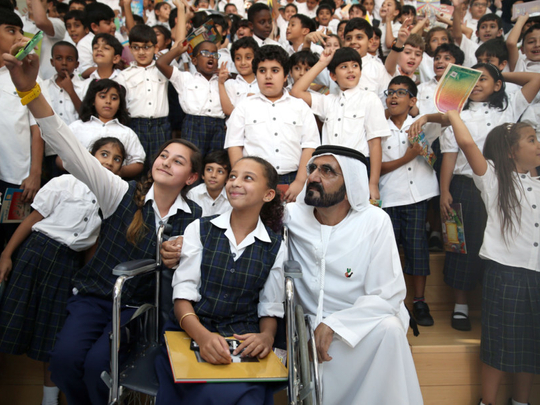
Dubai: Today (Monday) one student will be going home with $150,000 (Dh550,000) for winning the first prize of the first edition of the Arab Reading Challenge (ARC) after passing a final test.
His Highness Shaikh Mohammad Bin Rashid Al Maktoum, Vice-President and Prime Minister of the UAE and Ruler of Dubai, had launched the Arab Reading Challenge in September 2015, and it aimed for a million students in the Arab world to read 50 million books.
Out of the total $150,000 first place prize, S100,000 will go towards the winner’s university education and $50,000 will be given to his/her family.
The award ceremony will be held at the Dubai Opera today (Monday), where the three finalists out of the 18, who were chosen during Saturday and Sunday’s trial, will take part in the final test to decide on the winner.
The total prize money for all the different categories is Dh11 million, which include the best school from all participating countries, best supervisor from each UAE education zones and best supervisor from each participating country, among other prizes.
Mohammad Abdullah Al Gergawi, Minister for Cabinet Affairs and the Future and chairman of ARC’s Organising Committee, said that the award exceeded expectations in terms of student participation.
The challenge’s 2015-16 edition attracted 3.59 million students from 54 nationalities, representing 30,000 schools in 21 countries, which was more than triple the target of one million students.
Over the weekend, 240 students from 21 countries made it to the UAE for the final challenge, after they beat more than 3.5 million students in the elimination stages.
Since September last year, these students have each read and summarised in detail at least 50 books — and some have exceeded that number.
The pan-Arab reading competition included school students in 15 Arab countries — UAE, Saudi Arabia, Egypt, Oman, Bahrain, Kuwait, Qatar, Lebanon, Jordan, Palestine, Tunisia, Sudan, Morocco, Algeria and Mauritania, with the aim of encouraging the culture of reading.
More than 60,000 teachers applied for the role of supervisors in the challenge.
When Shaikh Mohammad first announced the ARC, he said “The Arab world is suffering from a reading crisis whose consequences we see and feel every day in this region. The 50 million book challenge is the first of many steps we are taking in the hope of creating a long-term impact that would change this reality.”
He added, “Reading opens minds, magnifies hunger for knowledge, and instils the values of openness and moderation that define great civilizations.”
“The first book a child reads opens the first door in that child’s brighter future. The 50 million book challenge is the first of many steps. It will be followed by many initiatives. The goal is to create a new generation, a new hope and a new reality. Today we set this challenge for the Arab educational sector, Arab parents, and Arab children and youth. We have every faith in their abilities to achieve the goal.”
Under the competition’s guidelines, each of the 18 finalists faces a series of tough questions by the judging panel. Each of the 50 books read by participants must be in Arabic. If Arabic is not their first language, this number is reduced to 25.
Books on religion and science, as well as fictional novels, seemed to be popular with finalists.
According to statistics issued by the Arab Thought Foundation on cultural development, the annual average reading rate for an Arab child is six minutes compared to a 12,000 minute average for children in the West.
Tala’a Al Amal Highschool from Palestine, is one of the schools shortlisted for the best school from all participating countries category. The school has a total of 3,100 students of which 800 participated in the challenge.
Al Iman schools – Girls from Bahrain has also qualified to the final stages.







